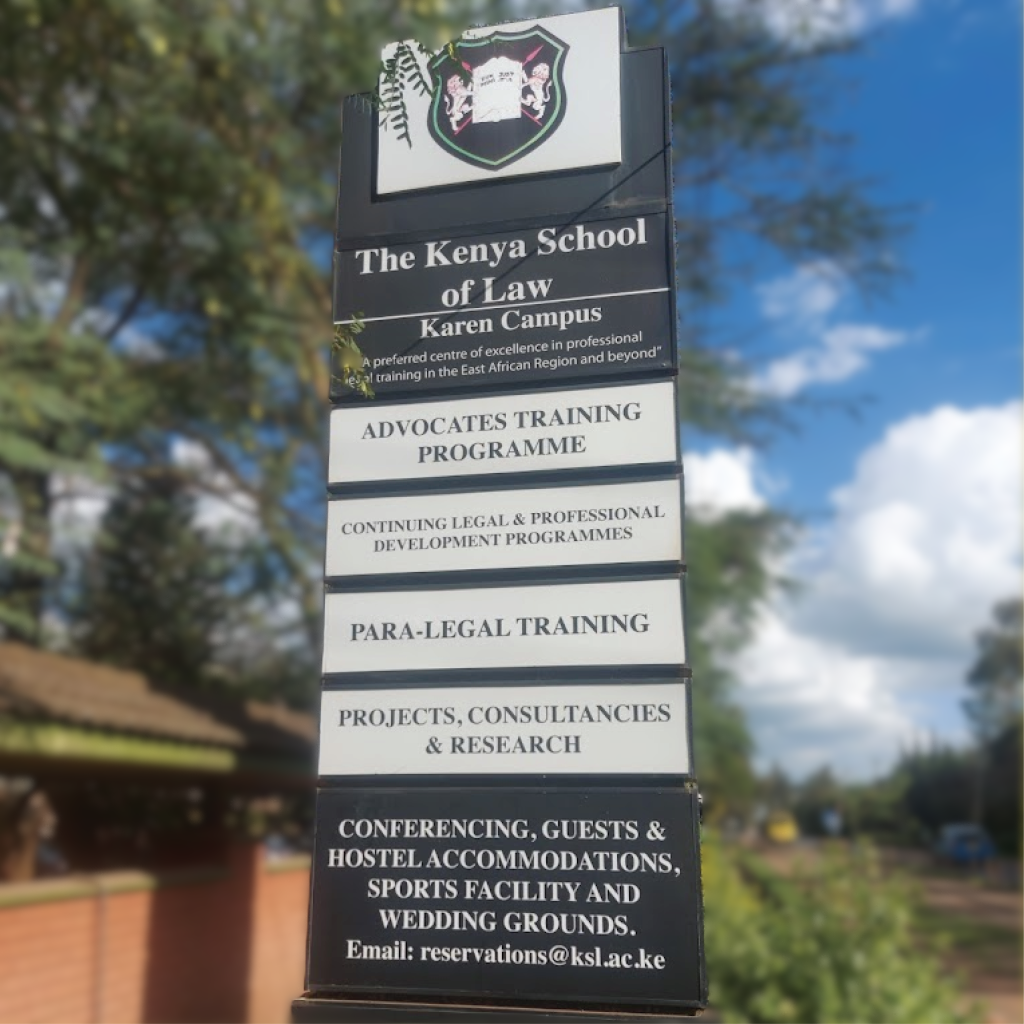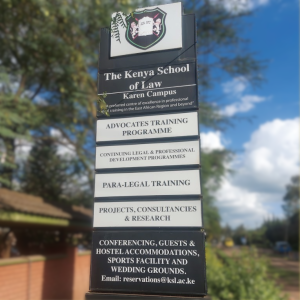BY
STANLEY GATHAGA MWANGI
AN ADVOCATE OF THE HIGH COURT OF KENYA
- INTRODUCTION
On 7th March 2025, the Court of Appeal in Kenya gave a landmark judgment where it set aside the judgment of Hon. L.N Mugambi J in Nairobi High Court Petition No. E010 of 2023. The learned judge of the High Court had dismissed the Appellant’s petition which was seeking the following orders;
- A declaration that pursuant to section 8(3)(a) of the Legal Education Act, No. 27 of 2012, it is the exclusive mandate of the Council of Legal Education to make Regulations in respect of requirements for the admission of persons seeking to enroll in all legal education programmes including the Advocates Training Programme (Post Graduate Diploma in Law).
- A declaration that section 16 of the Kenya School of Law Act, No. 26 of 2012, and the second schedule thereto are inconsistent with the provisions of section 8(3)(a) of the Legal Education Act, No. 27 of 2012 in so far as they purport to prescribe requirements for admission of persons seeking to enroll in legal education programmes such as the Advocates Training Programme (Post Graduate Diploma in Law).
- A declaration that section 16 of the Kenya School of Law Act, No. 26 of 2012 and the second schedule thereto are null and void to the extent that they purport to contradict section 8(3) of the Legal Education Act, No. 27 of 2012 which is a specific legislation to licensing, regulation and supervision of legal education providers such as the Kenya School of Law.
- A declaration that section 16 of the Kenya School of Law Act, No. 26 of 2012, and the second schedule thereto violate Article 27 of the Constitution and are discriminatory to other legal education providers to the extent that they single out one legal education provider in the Republic of Kenya namely the Kenya School of Law and purport to prescribe requirements for persons seeking to enroll in its legal education programmes and therefore unconstitutional, null and void.
- A declaration that section 16 of the Kenya of Law Act, No. 26 of 2012, and the second schedule thereto are inconsistent, null and void for violating the mandate of the Council of Legal Education under section 8(3)(c) of the Legal Education Act, 2012 to formulate a system for recognising prior learning and experience in law to facilitate progression in legal education from lower levels of learning to higher levels.
- A declaration that pursuant to section 8(1)(b), 8(3)(a), 8(4), 18 and 19 of the Legal Education Act, No. 27 of 2012, the Council of Legal Education has a mandate/duty to develop the regulatory framework, standards and license other Legal Education Providers that meet the established criteria to provide training in the Advocates Training Programme (in addition to the Kenya School of Law).
- An order for judicial review by way of mandamus do issue compelling the Council of Legal Education to develop and publish on its website and at least one local daily newspaper with national circulation the regulatory framework and standards for application for accreditation by Legal Education Providers (other than the Kenya School of Law) for licensing to offer the Advocates Training Programme (Post Graduate Diploma in Law within 45 days of the judgment herein.
- Any further relief that the court deems fit to make in the interest of justice.
- The costs of this petition be awarded to the petitioner.
The Court of appeal agreed with the appellant’s argument that there indeed exists a conflict between Section 16 of the Kenya School of Law Act, the Second Schedule of the Kenya School of Law Act and Section 8(3) (c) of the Legal Education Act.
The Appellant’s argument was that the Kenya School of Law Act was an Act only catering for the establishment of the Kenya School of Law (KSL) whereas the Legal Education Act was the Act specifically providing for regulation and licensing of legal education providers. He argued that the KSL Act had no business dictating the requirements for enrolling to the Advocates Training Programme and the same should be a preserve of the Legal Education Act.
He also argued that Section 16 of the KSL Act and its second schedule was quite discriminatory since it was only making reference to the KSL and it was not taking into consideration the fact that there are other legal education providers in the country. KSL therefore had a monopoly on the provision of the Advocates Training Programme (ATP).
The Appellant also argued that the Council of Legal Education (CLE) had failed to set up the regulatory framework for licensing other legal education providers despite the recommendations from the Taskforce Report on Legal Sector Reforms, 2018. A fact that was even acknowledged by legal counsel for CLE during the hearing of the appeal. He also put it to the Court of Appeal that the KSL was overwhelmed and struggling to cope with the large number of students enrolling to the Advocates Training Programme hence affecting the quality of legal education being rendered. He averred that the same shall affect the quality of legal services offered to the general public at large once the students leave the Advocates Training Programme.
The 1st to the 3rd Respondents entered appearance and responded to the appeal. Their main argument was that the regulatory framework was missing because they were yet to receive any applications from any legal education providers to provide the Advocates Training Programme. They argued that nothing stopped any applications being received hence CLE cannot be faulted because it did not deny any institution the rights to offer the Advocates Training Programme. The KSL failed to enter appearance despite service.
The Court of Appeal in rendering its judgment pointed out that the regulations were an imperative pre-requisite to any applications by legal education providers and the Legal Education Act, being the legislation providing for licensing and regulation of legal education providers, is the applicable Act when it comes to legal training in Kenya including the Advocates Training Programme. The appeal was subsequently allowed and all the orders the Appellant was seeking in his petition in the High Court were granted thereby opening up the legal education provision landscape.
Having read the entire judgment this article, shall consider the positive and negative effects of the court of appeal’s judgment on the legal education provision landscape because regardless of whether you agree or disagree with the finding, the impact shall be felt.
The positive effects of the Court of Appeal judgment in COACA NO. E625 OF 2023 on the legal education landscape
Cost effective for the ATP students
By striping the KSL off the monopoly to offer the ATP and allowing other legal education providers to do the same, there shall be a reduction in the tuition fees charged for the ATP. Prior to the Court of Appeal’s judgment, KSL had the monopoly over the ATP therefore the tuition fees charged was completely at its discretion.
Opening it up to other players will create competition which will inevitably lead to a reduction in the tuition fees. The main complaint most ATP students have is that the tuition fees are prohibitively high and given that most students are self-sponsored, it places an enormous financial burden on them. Even though the KSL has set up a revolving fund, there is only so many students it can help and it is not a long-lasting solution.
Outside of the ATP tuition fees, there are also other costs that ATP students incur while they are at the KSL. These costs include accommodation, transport and food. Since the KSL, which is located in Karen, Nairobi is the only institution offering the ATP, all the students who wish to join the programme have to move from their homes and find accommodation closer to the KSL. Given that it is located in Karen, Nairobi, students are forced to either get very expensive accommodation within Karen or have to live in nearby towns which means that they would have to incur transport costs on top of other basic needs costs.
Noting that the ATP requires the students to attend classes and do project work for a period of 12 months, it becomes very expensive for the students.
If the students could be able to access the ATP from their local universities which have been licensed, most of the accommodation costs and transport costs could be eliminated and channeled towards the tuition fees. This would be a huge plus for the students financially and intellectually thereby improving the annual pass rate which is always a concern. If a student is more comfortable with his/her environment, there is a huge likelihood for them to pass the bar exam at the first attempt.
In addition to the above, most ATP students are also normally under employment and they struggle with balancing their employment duties and arriving for class on time. If a student is able to go through the ATP from their local university, they can be able to comfortably manage the balance.
Ease the burden on the KSL resources
The KSL being the only institution offering the ATP places immense pressure on it. The number of students applying for the ATP is always rising and if the burden is not eased on the institution, the quality of legal education provided shall go down. A good example is the KSL Library, having been at the KSL, I can attest that its library is quite small and can only hold a certain amount of students at any one time. The average population of the KSL is around 1,500 students and all of them are supposed to be served by one library.
The diversification of the ATP to other legal service providers, will help the KSL deal with this issue and eliminate the need of having to build a new library. Other than the library, there are other resources at the KSL that have been stretched. The lecture halls also have a set capacity of students they can handle, the student accommodation only serves a handful of students and its cafeteria is also quite small unable to even hold a capacity of 200 students let alone 1,500.
Allowing other legal education providers like universities to run the ATP, will ease the aforementioned burden on the KSL and to some extent provide even better conditions to the students since universities are ready-built to handle large numbers of students at any given time.
University libraries are always stocked with informative and relevant materials which means the students shall not struggle to conduct research for their project work. Also since universities have a bigger workforce in terms of lecturers as compared to the KSL, programmes like the oral examinations shall be conducted at a fraction of the time it takes the KSL to conduct them.
All in all whichever burden that can be alleviated from the KSL will be much welcomed and will only work towards improving the quality of its output.
Improve the lecture sessions due to the diversity of lecturers
In the current format, the ATP students are only taught by lecturers appointed by the KSL and all the students who pass through their hands, are taught in the same way and taught the same thing.
If other legal education providers are brought into the mix, ATP students will be able to learn from a variety of lecturers who may be more experienced and have a deeper knowledge of the ATP’s content as compared to the KSL lecturers. This will not only improve the quality of advocates released into the market but also significantly improve the annual pass rate.
Other legal education institutions, such as private universities, may also be able to afford to call renowed legal speakers to address the ATP students on how best to tackle the bar exam and succeed at the first attempt. The KSL being a government institution will forever be curtailed by its allocated budget and the bureaucracy of money that plagues all government institutions thus denying the students such opportunities.
The more we can equip the ATP students with the necessary knowledge, the better the legal profession will be.
The negative effects of the Court of Appeal judgment in COACA NO. E625 OF 2023 on the legal education landscape
Having looked at some of the positive effects of the Court of Appeal’s judgment, it is also vital that we look at some of the negative effects.
Quality control
Since the KSL is in control of all the aspects of the ATP, it is able to ensure that the quality of the legal education consumed by the students is of acceptable standards. Allowing other legal education providers to offer the ATP takes away the KSL’s ability to know what the ATP students are being taught at any given time.
Class attendances is also another crucial aspect of the ATP programme and students who don’t attend a certain number of classes over the 12 months period are not eligible to be awarded their project work and oral examination marks. If other institutions other than the KSL are allowed to offer the ATP, it will be near impossible to ensure that such a rule is being complied with especially when lecturers agree to collude with the students.
This may lead to a scenario where students are not attending classes yet they shall sit for the bar exam at the end of the year and be expected to perform well.
Pupillage, which is also a key part of the ATP, it will be very difficult to monitor since the KSL will have no control of how the students are being evaluated. Given that the KSL sends one of its lecturers to carry out the evaluation, it is able to ensure that the students were properly evaluated and learnt what was required of them. Should that level of control be taken off their hands, it may cause a severe discrepancy of how each student is evaluated since each institution may have its own criteria.
The CLE would also have a big challenge when it comes to setting of the bar exam since it will have to consult with all the institutions that offer the ATP so as to ensure that the exam considers the environment and content consumed by all ATP students.
From the foregoing, it is clear to see that there would be an issue in ensuring that the ATP students are well equipped once they leave the programme and the first few years of the diversification could have some serious quality control challenges.
Missing marks menace
During the ATP, students are required to do project work in their requisite firm groups and also do an oral examination. For both tests, there are marks that are awarded by the KSL lecturers and those marks play a vital role in deciding whether a student shall pass or fail the bar exam.
If other legal education providers like universities are allowed to offer the ATP, there is a good likelihood that a number of students will suffer from missing marks. The missing marks menace is something that affects university students constantly and, in some cases, delays their graduation by years. The same is normally caused by various factors but the main one being the shear large number of students within a university. Since a lecturer is handling almost 200 students at a go, there is a good likelihood that some of those students’ marks shall miss. Given that the ATP is the last hurdle one has to jump before becoming eligible for admission as an advocate of the High Court of Kenya, missing marks could curtail the steady in flow of advocates into the market.
In the KSL since the number of students a lecturer is handling is not as high as a university lecturer, there is a very small likelihood of there being missing marks and even if there are cases of missing marks, the same can be resolved at a much faster rate as compared to other legal education providers.
Reduce/discourages intermingling of ATP students
The beauty of the KSL offering the ATP, is that it brings together students from all over the country who meet up at the KSL and exchange ideas and sharpen each other. This not only opens up the students to other ideas and opportunities but also allows them to have meaningful debates which improve them intellectually.
In the legal profession, advocates despite being on opposing sides find themselves working together and appreciating their different points of view. If KSL is stripped off its monopoly, and ATP students potentially never meet each other, they will be denied this opportunity to sharpen each other and create lasting professional relationships which can help them in their career.
- CONCLUSION
In my opinion, the monopoly being stripped off the KSL can only be a good thing since it will give more students an opportunity to apply and get admitted. As pointed out above, the number of students applying to join the KSL is only rising and we will reach a point where the institution can no longer accommodate the large number of students.
The CLE has up until mid-April to publish the regulatory framework to govern how other legal education providers shall be licensed and it shall be fascinating to see what it shall entail, either way it will have a seismic effect on the legal education landscape.
© All rights reserved by the author Stanley Gathaga Mwangi

19TH MARCH 2025
DISCLAIMER
This article is solely for educational purposes and should not be construed howsoever as legal advice. In case of any queries or consultation, feel free to reach the litigation department through the email info@ckadvocates.co.ke or Tel 0723403703/0703240153
BE IN THE KNOW!
Subscribe to our newsletter updates via https://ckadvocates.co.ke/










